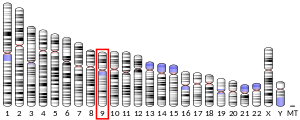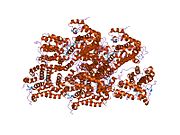PPP2R4
Serine/threonine-protein phosphatase 2A regulatory subunit B' is an enzyme that in humans is encoded by the PPP2R4 gene.[5][6]
Protein phosphatase 2A is one of the four major Ser/Thr phosphatases and is implicated in the negative control of cell growth and division. Protein phosphatase 2A holoenzymes are heterotrimeric proteins composed of a structural subunit A, a catalytic subunit C, and a regulatory subunit B. The regulatory subunit is encoded by a diverse set of genes that have been grouped into the B/PR55, B'/PR61, and B/PR72 families. These different regulatory subunits confer distinct enzymatic specificities and intracellular localizations to the holozenzyme. The product of this gene belongs to the B' family. This gene encodes a specific phosphotyrosyl phosphatase activator of the dimeric form of protein phosphatase 2A. Alternative splicing results in multiple transcript variants encoding different isoforms.[6]
Interactions
PPP2R4 has been shown to interact with PPP2R3A,[7] CCNG1[8] and Janus kinase 2.[9]
References
- ^ a b c GRCh38: Ensembl release 89: ENSG00000119383 – Ensembl, May 2017
- ^ a b c GRCm38: Ensembl release 89: ENSMUSG00000039515 – Ensembl, May 2017
- ^ "Human PubMed Reference:". National Center for Biotechnology Information, U.S. National Library of Medicine.
- ^ "Mouse PubMed Reference:". National Center for Biotechnology Information, U.S. National Library of Medicine.
- ^ Van Hoof C, Aly MS, Garcia A, Cayla X, Cassiman JJ, Merlevede W, Goris J (Feb 1996). "Structure and chromosomal localization of the human gene of the phosphotyrosyl phosphatase activator (PTPA) of protein phosphatase 2A". Genomics. 28 (2): 261–72. doi:10.1006/geno.1995.1140. PMID 8530035.
- ^ a b "Entrez Gene: PPP2R4 protein phosphatase 2A activator, regulatory subunit 4".
- ^ Davis, Anthony J; Yan Zhen; Martinez Bobbie; Mumby Marc C (Jun 2008). "Protein phosphatase 2A is targeted to cell division control protein 6 by a calcium-binding regulatory subunit". J. Biol. Chem. 283 (23). United States: 16104–14. doi:10.1074/jbc.M710313200. ISSN 0021-9258. PMC 2414307. PMID 18397887.
{{cite journal}}: CS1 maint: unflagged free DOI (link) - ^ Okamoto, K; Kamibayashi C; Serrano M; Prives C; Mumby M C; Beach D (Nov 1996). "p53-dependent association between cyclin G and the B' subunit of protein phosphatase 2A". Mol. Cell. Biol. 16 (11). UNITED STATES: 6593–602. doi:10.1128/mcb.16.11.6593. ISSN 0270-7306. PMC 231661. PMID 8887688.
- ^ Fuhrer, D K; Yang Y C (Jul 1996). "Complex formation of JAK2 with PP2A, P13K, and Yes in response to the hematopoietic cytokine interleukin-11". Biochem. Biophys. Res. Commun. 224 (2). UNITED STATES: 289–96. doi:10.1006/bbrc.1996.1023. ISSN 0006-291X. PMID 8702385.
Further reading
- Andersen JL, Planelles V (2005). "The role of Vpr in HIV-1 pathogenesis". Curr. HIV Res. 3 (1): 43–51. doi:10.2174/1570162052772988. PMID 15638722.
- Le Rouzic E, Benichou S (2006). "The Vpr protein from HIV-1: distinct roles along the viral life cycle". Retrovirology. 2: 11. doi:10.1186/1742-4690-2-11. PMC 554975. PMID 15725353.
{{cite journal}}: CS1 maint: unflagged free DOI (link) - Zhao RY, Elder RT (2005). "Viral infections and cell cycle G2/M regulation". Cell Res. 15 (3): 143–9. doi:10.1038/sj.cr.7290279. PMID 15780175.
- Zhao RY, Bukrinsky M, Elder RT (2005). "HIV-1 viral protein R (Vpr) & host cellular responses". Indian J. Med. Res. 121 (4): 270–86. PMID 15817944.
- Soprano KJ, Purev E, Vuocolo S, Soprano DR (2006). "Rb2/p130 and protein phosphatase 2A: key mediators of ovarian carcinoma cell growth suppression by all-trans retinoic acid". Oncogene. 25 (38): 5315–25. doi:10.1038/sj.onc.1209679. PMID 16936753.
- Jakes S, Mellgren RL, Schlender KK (1986). "Isolation and characterization of an inhibitor-sensitive and a polycation-stimulated protein phosphatase from rat liver nuclei". Biochim. Biophys. Acta. 888 (1): 135–42. doi:10.1016/0167-4889(86)90079-0. PMID 3017441.
- Turowski P, Fernandez A, Favre B, et al. (1995). "Differential methylation and altered conformation of cytoplasmic and nuclear forms of protein phosphatase 2A during cell cycle progression". J. Cell Biol. 129 (2): 397–410. doi:10.1083/jcb.129.2.397. PMC 2199911. PMID 7721943.
- Maruyama K, Sugano S (1994). "Oligo-capping: a simple method to replace the cap structure of eukaryotic mRNAs with oligoribonucleotides". Gene. 138 (1–2): 171–4. doi:10.1016/0378-1119(94)90802-8. PMID 8125298.
- Cayla X, Van Hoof C, Bosch M, et al. (1994). "Molecular cloning, expression, and characterization of PTPA, a protein that activates the tyrosyl phosphatase activity of protein phosphatase 2A". J. Biol. Chem. 269 (22): 15668–75. PMID 8195217.
- Okamoto K, Kamibayashi C, Serrano M, et al. (1996). "p53-dependent association between cyclin G and the B' subunit of protein phosphatase 2A". Mol. Cell. Biol. 16 (11): 6593–602. doi:10.1128/mcb.16.11.6593. PMC 231661. PMID 8887688.
- Tung HY, De Rocquigny H, Zhao LJ, et al. (1997). "Direct activation of protein phosphatase-2A0 by HIV-1 encoded protein complex NCp7:vpr". FEBS Lett. 401 (2–3): 197–201. doi:10.1016/S0014-5793(96)01470-6. PMID 9013886.
- Hériché JK, Lebrin F, Rabilloud T, et al. (1997). "Regulation of protein phosphatase 2A by direct interaction with casein kinase 2alpha". Science. 276 (5314): 952–5. doi:10.1126/science.276.5314.952. PMID 9139659.
- Suzuki Y, Yoshitomo-Nakagawa K, Maruyama K, et al. (1997). "Construction and characterization of a full length-enriched and a 5'-end-enriched cDNA library". Gene. 200 (1–2): 149–56. doi:10.1016/S0378-1119(97)00411-3. PMID 9373149.
- Ruediger R, Brewis N, Ohst K, Walter G (1998). "Increasing the ratio of PP2A core enzyme to holoenzyme inhibits Tat-stimulated HIV-1 transcription and virus production". Virology. 238 (2): 432–43. doi:10.1006/viro.1997.8873. PMID 9400615.
- Ogris E, Du X, Nelson KC, et al. (1999). "A protein phosphatase methylesterase (PME-1) is one of several novel proteins stably associating with two inactive mutants of protein phosphatase 2A". J. Biol. Chem. 274 (20): 14382–91. doi:10.1074/jbc.274.20.14382. PMC 3503312. PMID 10318862.
{{cite journal}}: CS1 maint: unflagged free DOI (link) - Janssens V, Van Hoof C, De Baere I, et al. (2000). "Functional analysis of the promoter region of the human phosphotyrosine phosphatase activator gene: Yin Yang 1 is essential for core promoter activity". Biochem. J. 344 (3): 755–63. doi:10.1042/0264-6021:3440755. PMC 1220697. PMID 10585862.
- Janssens V, van Hoof C, Martens E, et al. (2000). "Identification and characterization of alternative splice products encoded by the human phosphotyrosyl phosphatase activator gene". Eur. J. Biochem. 267 (14): 4406–13. doi:10.1046/j.1432-1327.2000.01486.x. PMID 10880964.
- Elder RT, Yu M, Chen M, et al. (2001). "HIV-1 Vpr induces cell cycle G2 arrest in fission yeast (Schizosaccharomyces pombe) through a pathway involving regulatory and catalytic subunits of PP2A and acting on both Wee1 and Cdc25". Virology. 287 (2): 359–70. doi:10.1006/viro.2001.1007. PMID 11531413.












